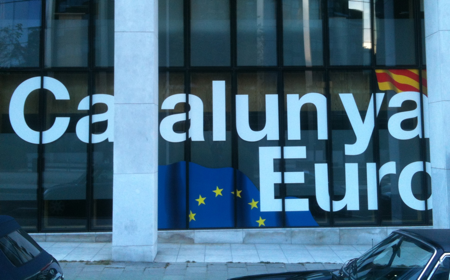“We have won”, claimed Artur Mas on Sunday, 27 September, when his party, CDC (Convergència Democràtica de Catalunya, for Democratic Convergence of Catalonia) obtained the majority during regional elections in Catalonia.
However, to obtain the majority in the regional parliament he needed to form a coalition. The coalition called Junts pel si, together for “yes” [to independence], is a combination of CDC and the Republican Left of Catalonia (Esquerra Republicana de Catalunya – ERC). The two political parties share the goal of Catalonia’s independence, but CDC is a right-wing conservative party, while ERC is far left and anti-capitalist. Together they won 62 seats out of the total of 135. In addition to these seats, the 10 seats of the CUP party (Candidatura d’Unitat Popular for Popular Unity Candidacy) are needed to reach the absolute majority in parliament.
Pro-independent parties may now together occupy 72 seats in the 135-seat regional parliament, but they obtained only 47,8% of the votes. This is about 2 million citizens of Catalonia out of the more than 4 million who went to vote. Voter participation in this election was the highest so far in the region, combining young and old people, in the cities and in the country side. To launch their project of independence, pro-independence parties needed to fulfill two conditions: win the absolute majority in parliament and get the majority of votes. The fact that they did not fulfill the latter condition did not stop the Catalan press from claiming victory for the “yes” to independence.
Two days after the elections, the President of the region Artur Mas was summoned to appear before the high court of Catalonia. He is accused of civil disobedience, abuse of power and holding of a non-binding referendum. In November of last year, Mr. Mas had organised a symbolic consultation about Catalonia’s independence. His appearance in front of the judges is scheduled for 15 October. According to Antonio Baños, leader of CUP, the other two million people who participated in the consultation should be sued as well.
From outside Spain, the Vice-President of Lombardy’s regional council and member of the Italian pro-independence party Lega Nord gave his support to Artur Mas claiming that the ideas of freedom and independence could not be put on trial. Lega Nord is one of several separatist parties in Europe, such as NV-A in Belgium. NV-A is in the majority in the Belgian government, and supports the independence of Flanders. At the level of the European Union, the European Free Alliance (EFA) is a group in the European Parliament composed of various regionalist and separatist parties in the different member states. Jordi Solé is a member of the Republican Left of Catalonia and the actual secretary-general of EFA.
After the elections in Catalonia, Spanish Prime Minister Mariano Rajoy, of the People’s Party, claimed that he will always defend the unity of his country. Unity will be one of his main points for the next national elections in Spain due to take place on 20 December 2015.



